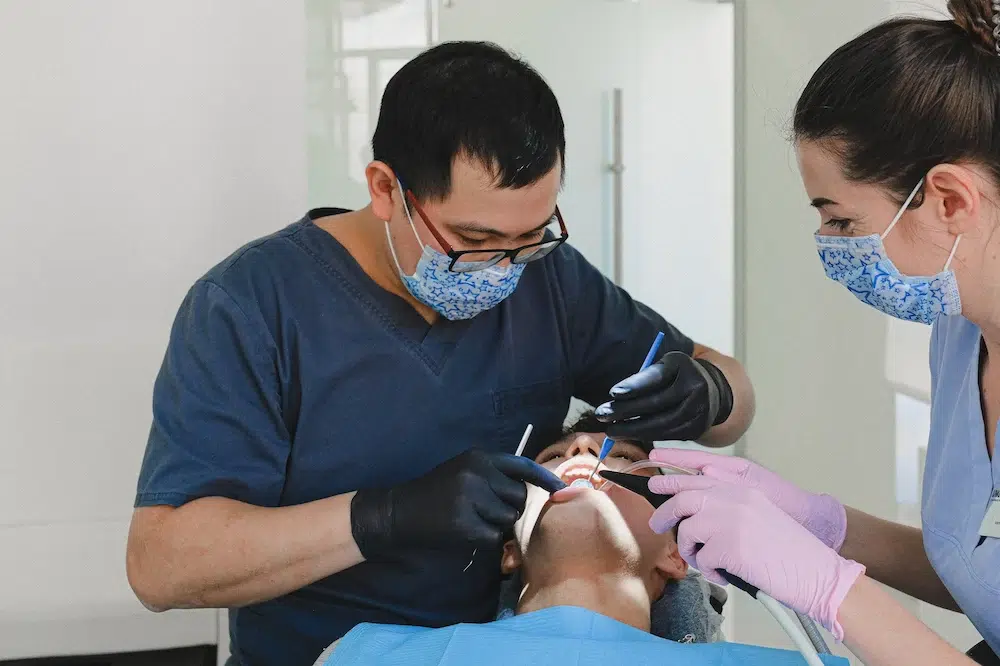
Why Are Dental Teams Qualified To Provide A Treatment Option For OSA
When it comes to tackling the silent menace of Obstructive Sleep Apnea (OSA), one can wonder, “why are dental teams qualified to provide a treatment option for OSA?”
Well, dentists aren’t just about cleanings and fillings. Their knowledge of mouth structure and jaw alignment makes them key players in treating OSA.
As you delve further, you’ll discover the unique ways dental experts bring their skills to the forefront, ensuring everyone sleeps a little easier at night.
The Role Of Dental Teams In Sleep Medicine
Expanding The Scope Of Dental Practice
Dentistry isn’t just about teeth anymore. With new research, we’ve discovered the deep link between oral health and sleep quality.
Dentists are now trained to spot signs of sleep disorders like teeth grinding, which could be a sign of deeper sleep issues.
Introduction To Dental Sleep Medicine
Dental sleep medicine looks at how our mouth affects sleep. One common problem is obstructive sleep apnea, where the airway gets blocked during sleep.
Dentists can provide devices, similar to mouth guards, that help keep the airway open, ensuring a good night’s sleep.
Collaboration Between Dental Teams And Sleep Specialists
It’s vital for dentists and sleep experts to work together. When a dentist spots signs of a sleep problem, they can refer the patient to a sleep specialist.
Together, they design treatments that consider both dental and sleep needs, ensuring comprehensive care.
Understanding OSA And Its Dental Implications
Causes and Risk Factors Of OSA
Extra Weight:
Being overweight can make the throat muscles weaker or lead to extra tissue that blocks the airway.
Throat And Tongue Muscles:
For some people, these muscles relax too much during sleep, causing a block.
Shape Of Head And Neck:
A person’s natural shape can mean a smaller airway, leading to OSA.
Dental Signs And Symptoms Of OSA
Teeth Grinding:
Many people with OSA grind their teeth at night. This can wear down the teeth.
Dry Mouth:
Breathing through the mouth because of blocked airways can cause dry mouth.
Sore Throat:
People with OSA will wake up with a sore throat from mouth breathing.
Oral Health’s Impact On Sleep-Related Breathing Disorders
How you take care of your mouth can affect your sleep. For example, gum diseases can cause swelling in the throat, making the airway narrow.
Also, missing teeth or certain dental issues can change how the tongue rests, potentially blocking the airway.
Regular dental check-ups can spot and treat these issues early, helping you breathe better during sleep.
Dental Treatment Options For OSA
Oral Appliance Therapy (OAT)
Explanation Of OAT And How It Works
Oral Appliance Therapy, or OAT, is a treatment for OSA. Instead of machines or surgery, patients wear a special device in their mouth, similar to a sports mouthguard or orthodontic retainer.
This device is designed to hold the jaw in a forward position. By doing so, it keeps the airway open, allowing for uninterrupted breathing during sleep.
Customized Oral Appliances For OSA Patients
One-size-fits-all doesn’t work here. Everyone’s mouth is different. For OAT to be effective, the device must be customized for each patient.
A dentist will take an impression of the patient’s teeth, ensuring the appliance fits perfectly.
This snug fit ensures it’s comfortable and works as intended, keeping the airway open.
Advantages Of OAT Over Traditional Treatments
CPAP (Continuous Positive Airway Pressure) Alternatives
CPAP is a common treatment for OSA. It involves wearing a mask that pushes air into the airway, keeping it open.
However, some find CPAP machines loud and the masks uncomfortable. OAT offers a quieter, mask-free alternative.
While CPAP is effective, OAT can be a great option for those who don’t tolerate CPAP well.
Comfort And Compliance With OAT
One of the biggest challenges with any treatment is ensuring patients use it. Because OAT devices are customized, they’re generally more comfortable than generic devices.
Many patients find them easier to wear all night. Plus, they’re small and portable, making them ideal for travel.
Qualifications Of Dental Teams For OSA Treatment
Specialized Education And Training
Sleep-Related Continuing Education For Dentists:
Dentists attend specific courses on sleep disorders, particularly OSA. This ensures they’re up-to-date with the latest research, methods, and treatments related to sleep problems.
Dental Sleep Medicine Credentials And Certifications:
To offer specialized treatment for OSA, many dentists pursue additional certifications. These credentials demonstrate their expertise in addressing sleep disorders using dental approaches.
Utilization Of Advanced Technology
Diagnostic Tools For Identifying OSA:
Modern dentistry has introduced advanced tools that can detect signs of OSA. These devices, like sleep monitors, help dentists understand a patient’s breathing and sleep patterns.
Digital Imaging For Precise Oral Appliance Design:
To treat OSA effectively, patients often need custom oral appliances. Dentists use digital imaging to get a detailed view of a patient’s mouth.
It ensures that the designed appliance fits snugly and works as intended.
The Dental Team’s Role In OSA Management
Screening And Identifying At-Risk Patients
Dental Offices As A Potential Gateway To Early OSA Detection:
Dental offices often serve as the first line of defense against OSA. During regular check-ups, dentists can detect signs like teeth grinding that indicate sleep issues.
This makes dental offices crucial for early OSA detection.
Importance Of Patient Communication And Rapport:
Building trust with patients is vital. When patients feel comfortable, they’re more likely to share symptoms or concerns.
This open dialogue can help dentists identify potential sleep issues early on, leading to timely intervention.
Collaborating With Sleep Specialists And Healthcare Professionals
Referral Process For Comprehensive Care:
When a dentist suspects OSA, they don’t tackle it alone. They often refer patients to sleep specialists or other healthcare experts. This referral ensures the patient gets a full evaluation and the best possible care.
Coordinated Approach For Successful OSA Management:
Managing OSA isn’t a one-person job. Dentists, sleep experts, and sometimes other doctors work together. This team approach ensures all aspects of the patient’s health are considered.
Thus it will lead to a successful OSA treatment plan.
The Future Of Dental Teams In OSA Treatment
New Things In Dental Sleep Help
Dental experts are finding better ways to help with sleep problems. They are using new tools and ways like talking to patients over the computer (telemedicine) and making special mouth tools.
These new methods are easier for patients and work really well.
Studying More About Sleep Issues
People are studying a lot about sleep problems like OSA. They’re trying to know why it happens and how our teeth and gums are linked to it.
They’re looking at things like our genes and the tiny things living in our mouth (microbiome).
With each new discovery, they can help patients in better ways.
Dentists And Doctors Working Together
OSA is not just about teeth or sleep; it’s about our whole health. So, dentists and doctors think it’s a good idea to work together more.
When they team up, they can spot and treat sleep problems faster and better. This way of working together will help many people in the future.
FAQs
1. How Is Sleep Apnea Related To Dental?
Sleep apnea, especially OSA (Obstructive Sleep Apnea), can be influenced by dental issues like jaw alignment, tongue position, and mouth structure.
Teeth grinding at night, often a sign of sleep apnea, can also impact dental health.
2. What Can A Dentist Do For Sleep Apnea?
Dentists can design custom oral appliances, similar to mouthguards, to adjust the position of the jaw and tongue, improving airflow.
They also screen for OSA signs, like teeth grinding, and can refer patients to sleep specialists for further evaluation.
Conclusion
It’s now clear why dental teams qualified to provide a treatment option for OSA are so essential. Their expertise in the mouth’s anatomy and its link to breathing patterns is pivotal.
Just as a dentist can spot a cavity or gum issue, they can identify and address factors contributing to OSA.
Next time someone questions the link between dentistry and sleep, we know it’s vital for those seeking better rest.



